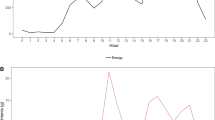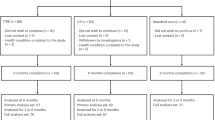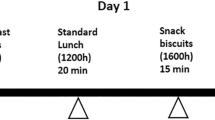Abstract
Objectives:
To evaluate if an improved daily glycemic profile could be achieved in patients with type 2 diabetes by withholding breakfast, but maintaining the same total daily intake of calorie and the same composition of carbohydrates, fat and protein.
Methods:
Thirteen type 2 diabetic patients participated in this randomized crossover study. Following an initial fasting night the study consisted of 4 consecutive days. Patients were randomized to diets including breakfast days 1 and 3, and excluding breakfast days 2 and 4, or vice versa.
Results:
The mean plasma glucose level was 0.24 mmol/l higher after the breakfast diet compared with the non-breakfast diet, but reflected only a tendency (P=0.066). The standard deviation based on plasma glucose was 32% higher after the breakfast diet compared with the non-breakfast diet (P<0.0001).
Conclusions:
Not all patients with type 2 diabetes may need breakfast. Moreover, a non-breakfast diet reduces glycemic variability.
This is a preview of subscription content, access via your institution
Access options
Subscribe to this journal
Receive 12 print issues and online access
$259.00 per year
only $21.58 per issue
Buy this article
- Purchase on Springer Link
- Instant access to full article PDF
Prices may be subject to local taxes which are calculated during checkout

Similar content being viewed by others
References
American Diabetes Association (2001). Postprandial blood glucose. American Diabetes Association. Diabetes Care 24, 775–778.
Berg C, Lappas G, Wolk A, Strandhagen E, Toren K, Rosengren A et al. (2009). Eating patterns and portion size associated with obesity in a Swedish population. Appetite 52, 21–26.
Cavalot F, Petrelli A, Traversa M, Bonomo K, Fiora E, Conti M et al. (2006). Postprandial blood glucose is a stronger predictor of cardiovascular events than fasting blood glucose in type 2 diabetes mellitus, particularly in women: lessons from the San Luigi Gonzaga Diabetes Study. J Clin Endocrinol Metab 91, 813–819.
Chen XM, Zhang Y, Shen XP, Huang Q, Ma H, Huang YL et al. (2010). Correlation between glucose fluctuations and carotid intima-media thickness in type 2 diabetes. Diabetes Res Clin Pract 90, 95–99.
DECODE Study Group (2001). Glucose tolerance and cardiovascular mortality: comparison of fasting and 2-h diagnostic criteria. Arch Intern Med 161, 397–405.
Gerich JE (2003). Clinical significance, pathogenesis, and management of postprandial hyperglycemia. Arch Intern Med 163, 1306–1316.
International Diabetes Federation (2007). Guideline for Management of Postmeal Glucose. Brussels: IDF, 1–27.
Monnier L, Colette C (2008). Glycemic variability: should we and can we prevent it? Diabetes Care 31 (Suppl 2), S150–S154.
Monnier L, Colette C, Dunseath GJ, Owens DR (2007). The loss of postprandial glycemic control precedes stepwise deterioration of fasting with worsening diabetes. Diabetes Care 30, 263–269.
Monnier L, Colette C, Owens DR (2008). Glycemic variability: the third component of the dysglycemia in diabetes. Is it important? How to measure it? J Diabetes Sci Technol 2, 1094–1100.
Woerle HJ, Neumann C, Zschau S, Tenner S, Irsigler A, Schirra J et al. (2007). Impact of fasting and postprandial glycemia on overall glycemic control in type 2 diabetes Importance of postprandial glycemia to achieve target HbA1c levels. Diabetes Res Clin Pract 77, 280–285.
Author information
Authors and Affiliations
Corresponding author
Ethics declarations
Competing interests
The authors declare no conflict of interest.
Rights and permissions
About this article
Cite this article
Parkner, T., Nielsen, J., Sandahl, T. et al. Do all patients with type 2 diabetes need breakfast?. Eur J Clin Nutr 65, 761–763 (2011). https://doi.org/10.1038/ejcn.2011.18
Received:
Revised:
Accepted:
Published:
Issue Date:
DOI: https://doi.org/10.1038/ejcn.2011.18



